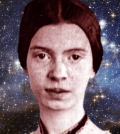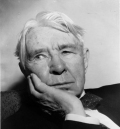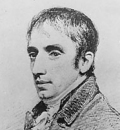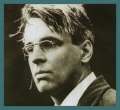Because. My name was never sung by anyone
and was forgotten, that’s why no one knows me. So,
no, I’m not Mneme or Aoede or Melete.
And, okay, I didn’t worship at Mt. Helicon or Delphi
and I’m definitely not
one of the Greeks’ nine.
Yes, I do know Plato identified Sappho of Lesbos
as the Tenth Muse. Fine, I’ll
be the Eleventh.
My gift allows artists to obsess over their crafts
without reference to passing
time. But for what?
Where’s my libations, my academic ink no one reads?
Nowhere, unless I manipulate
the fabric both ways,
like when I bend time to slow the ten minutes
before work ends, or when your
alarm clock’s
ten-minute snooze elapses faster than a thought
about how summers since childhood
have quickened
each year, each season the next, then disappearing.
›››|‹‹‹
This
poem appears in Pearl Magazine, Fall, 2006. |
REMORSE is memory awake,
Her companies astir,—
A presence of departed acts
At window and at door.
It's past set down before the soul,
And lighted with a match,
Perusal to facilitate
Of its condensed dispatch.
Remorse is cureless,—the disease
Not even God can heal;
For 't is His institution,—
The complement of hell. ›››|‹‹‹
1891 |
|
As my mother’s memory
dims
she’s losing her sense of smell
and can’t remember the toast
blackening the kitchen with smoke
or sniff how nasty the breath of the dog
that follows her yet from room to room,
unable, himself, to hear his own bark.
It’s thus they get around,
the wheezing old hound stone deaf
baying like a smoke alarm
for his amnesiac mistress whose back
from petting him is bent forever
as they shuffle towards the flaming toaster
and split the cindered crisp that’s left.
›››|‹‹‹
This
poem is soon to be featured in Ted Kooser's "American Life
in Poetry," coming out nationally on Nov 22nd. It will also
appear in a new book due out in August, 2008, called New England
Primer, from Cherry Grove Collections. |
His death like all death
is hard. There is no peace
in the darkness. His right eye,
the one that sees, is looking
for someone to comfort him.
He knows his mother is dead
but he whispers for her still,
the way he did as a boy
crying at her deathbed.
In his Polish the word
is three long, pleading
syllables: "Mamusha."
The second syllable
is stressed, the third
falls off into silence.
Just yesterday, he talked
a little, asked for water,
smiled, when I gave him some.
But today, he can only
call for his mother. Hope is
the cancer no drug can cure.
›››|‹‹‹
This
poem appears in Lightning and Ashes (Steel Toe Books, 2007). |
Of
History’s blood-drinkers
We were some of the gentlest:
Shy younger sons, passed over
In the first calls; silent
At dawn in the hungry classrooms,
Bashful in the dark streets going home.
Not a man of my squadron would dare
Raise his voice to his mother.
Japan will remember,
they said,
This glory is forever.
Anyway it was the fashion,
More or less, for boys everywhere:
Russians at Stalingrad, German
Submariners in the lost Atlantic,
The Yankees at Midway, not so long ago,
In their decrepit planes;
Our own in Asia all those years.
So what was strange?
Too polite to live, we tied
Our scarves, we drank our saki,
And off we went: most to fall
Like sizzling stones in the gray
And unremembering sea; just a few
To visit the strangling ships
In such fireballs and mushroom clouds
That hope flared darkly again
In the Planning Office. So we
Prolonged a while the hideous mistake
And that was glory.
But nothing is forever. Trifocalled
And gray, the last of our old classmates
Come smiling from the golf course.
Steadied by successful lives, they
Pause, frown, shake their heads
And cannot bring our faces back.
One day the world itself will fail
In flames of the expanding sun.
And what in all the darkness then
Can repay the scent of evening in the streets,
A lover’s smile, a moment’s breath?
›››|‹‹‹
This
poem appeared in Whetstone, December, 2002. |
cussing
Hoot
for hurling
another hanger
that should’ve
been a slider
cussing Flood
for a flopped rope
to center
two runs score
then another
a beer bottle
explodes
against flowered
blue wallpaper
t.v.
dripping
meatballs
and spaghetti
Lolich retakes
the mound
for the Tigers
screaming
more breaking
we scatter and hide
if my Cardinals lose
Grandma said
I’ll kill all
your sorry asses
›››|‹‹‹
|
Portree,
Isle of Skye. You took
a picture of me walking,
deep in thought, hands clasped
behind a Scottish coat, the sort with tartan
lining, as if that made some necessary
link with Robbie Burns.
Now more than twenty-five years
away, another life, another coat of stars
winks at our wicked loss of time.
What brings a lost friend back
to mind
after half a life? The chance he
may no longer walk
this weary, wasting earth?
Today’s open fluorescent
sun
that California glares so well still
seems like home for you.
I could launch an email search,
frame the old snapshot, wherever
it hides, upload those brain cells
dedicated to seeing your one driving
face that chased so many roads
we can’t believe it has withstood.
Has your heart been
ripped out at last
by someone
who didn’t know
to be careful?
How many lives
are lost
in a restless desert wind?
I will pray for you,
wherever you are, soul
that streaks
that remains
the still photographer
beyond the bay.
›››|‹‹‹
|
In
a thunderstorm, under that sky
gone the color of veins, I scratched my name
into knotty pine walls of the outhouse
with a hairpin:
ITILIA AUGUSTA.
Got a whipping on bare legs with a switch,
that my mother made me pick myself. She was
capable, one snap of the wrist, rooster’s
body went flapping across the dirt, already dead
head in her hand, beak opening, closing,
back-talk…My prideful ways were stripped, thrown
out, a pile of willow leaves and chicken feathers,
white-whiskered terrier didn’t even stir,
gnats flying around his eyes.
They said I was pretty, barefoot, in braids
that fell down to that dip in my back,
no one ever licked to taste sweet salt.
I was thirteen when he got permission
from my father, so I began my duties
as a wife. Bedtime he removed my hairpins,
one-by-one, lined them up on the windowsill,
undressed me like a child, skirt on a nail
for tomorrow, laid me down. I kept still.
Just looked at the tobacco juice on his
chin, and in the coffee can by the bed,
fly drifting at the surface. A little bit
of sun through the leaves that faced each other,
tree of heaven, seeds stuck on glass, poverty
the only window curtain.
The babies came fast as starlings, common
and mouthy, rolling each other out of bed
at night. I birthed seventeen,
one by myself, younger ones outside,
eating up all the good white peaches
I was going to can, sweet juice washing
grimy arms, tears dripping off elbows.
I wiped my hair back off my forehead,
damp as a cloud, and pushed another
little boy into this life, patted him
on my belly till my husband came home.
After so many, I didn’t have time
for fiddling with names, sometimes I rhymed them,
wrote them in my Bible, forgot them when
I was yelling about one thing or another.
General, Junior, Lester and Glen
Dicky and Jimmy, Tommy and Ronny
And Johnny … Arnett and Garnett, Velma
And Zelma, Wilma, Virginia, Cynthia,
And Paul and Itilia Rose.
Whole years went by
when I didn’t hear my own
thoughts. But I was Ita, and on lightning
green nights, I liked to slip away, muddy
plantain stuck between bare toes, to the outhouse,
pine seats, rubbed radiant with the work
of children’s bottoms. Then I’d take out those
hairpins that hurt my head, and step outside
softly, behind the hollyhocks and stand
in the rain.
›››|‹‹‹
Cody Sanantonio is a Montessori
teacher and owns a pet rooster named Lyle Lovett. |
Remembered
Women
Carl
Sandburg
FOR a woman's face remembered as a spot
of quick light on the flat land of dark night,
For this memory of one mouth and a forehead they go on in the gray
rain and the mud, they go on among the boots and guns.
The horizon ahead is a thousand fang flashes, it is a row of teeth
that bite on the flanks of night, the horizon sings of a new kill
and a big kill.
The horizon behind is a wall of dark etched with a memory, fixed
with a woman's face — they fight on and on, boots in the mud
and heads in the gray rain — for the women they hate and the
women they love — for the women they left behind, they fight
on.
›››|‹‹‹
1918 |
The
Two April Mornings
William
Wordsworth
WE
walked along, while bright and red
Uprose the morning sun;
And Matthew stopped, he looked, and said,
"The will of God be done!"
A village schoolmaster was
he,
With hair of glittering grey;
As blithe a man as you could see
On a spring holiday.
And on that morning, through
the grass,
And by the steaming rills,
We travelled merrily, to pass
A day among the hills.
"Our work," said
I, "was well begun,
Then, from thy breast what thought,
Beneath so beautiful a sun,
So sad a sigh has brought?"
A second time did Matthew stop;
And fixing still his eye
Upon the eastern mountain-top,
To me he made reply:
"Yon cloud with that long
purple cleft
Brings fresh into my mind
A day like this which I have left
Full thirty years behind.
"And just above yon slope
of corn
Such colours, and no other,
Were in the sky, that April morn,
Of this the very brother.
"With rod and line I sued
the sport
Which that sweet season gave,
And, to the church-yard come, stopped short
Beside my daughter's grave.
"Nine summers had she
scarcely seen,
The pride of all the vale;
And then she sang;—she would have been
A very nightingale.
"Six feet in earth my
Emma lay;
And yet I loved her more,
For so it seemed, than till that day
I e'er had loved before.
"And, turning from her
grave, I met,
Beside the church-yard yew,
A blooming Girl, whose hair was wet
With points of morning dew.
"A basket on her head
she bare;
Her brow was smooth and white:
To see a child so very fair,
It was a pure delight!
"No fountain from its
rocky cave
E'er tripped with foot so free;
She seemed as happy as a wave
That dances on the sea.
"There came from me a
sigh of pain
Which I could ill confine;
I looked at her, and looked again:
And did not wish her mine!"
Matthew is in his grave, yet
now,
Methinks, I see him stand,
As at that moment, with a bough
Of wilding in his hand.
›››|‹‹‹
1799
|
The
Wild Swans at Coole
William
Butler Yeats
THE
TREES are in their autumn beauty,
The woodland paths are dry,
Under the October twilight the water
Mirrors a still sky;
Upon the brimming water among the stones
Are nine and fifty swans.
The nineteenth Autumn has come upon me
Since I first made my count;
I saw, before I had well finished,
All suddenly mount
And scatter wheeling in great broken rings
Upon their clamorous wings.
I have looked upon those brilliant creatures,
And now my heart is sore.
All’s changed since I, hearing at twilight,
The first time on this shore,
The bell-beat of their wings above my head,
Trod with a lighter tread.
Unwearied still, lover by lover,
They paddle in the cold,
Companionable streams or climb the air;
Their hearts have not grown old;
Passion or conquest, wander where they will,
Attend upon them still.
But now they drift on the still water
Mysterious, beautiful;
Among what rushes will they build,
By what lake’s edge or pool
Delight men’s eyes, when I awake some day
To find they have flown away?
›››|‹‹‹
1919
top |
home |
this issue
more work by these
authors

|
|










